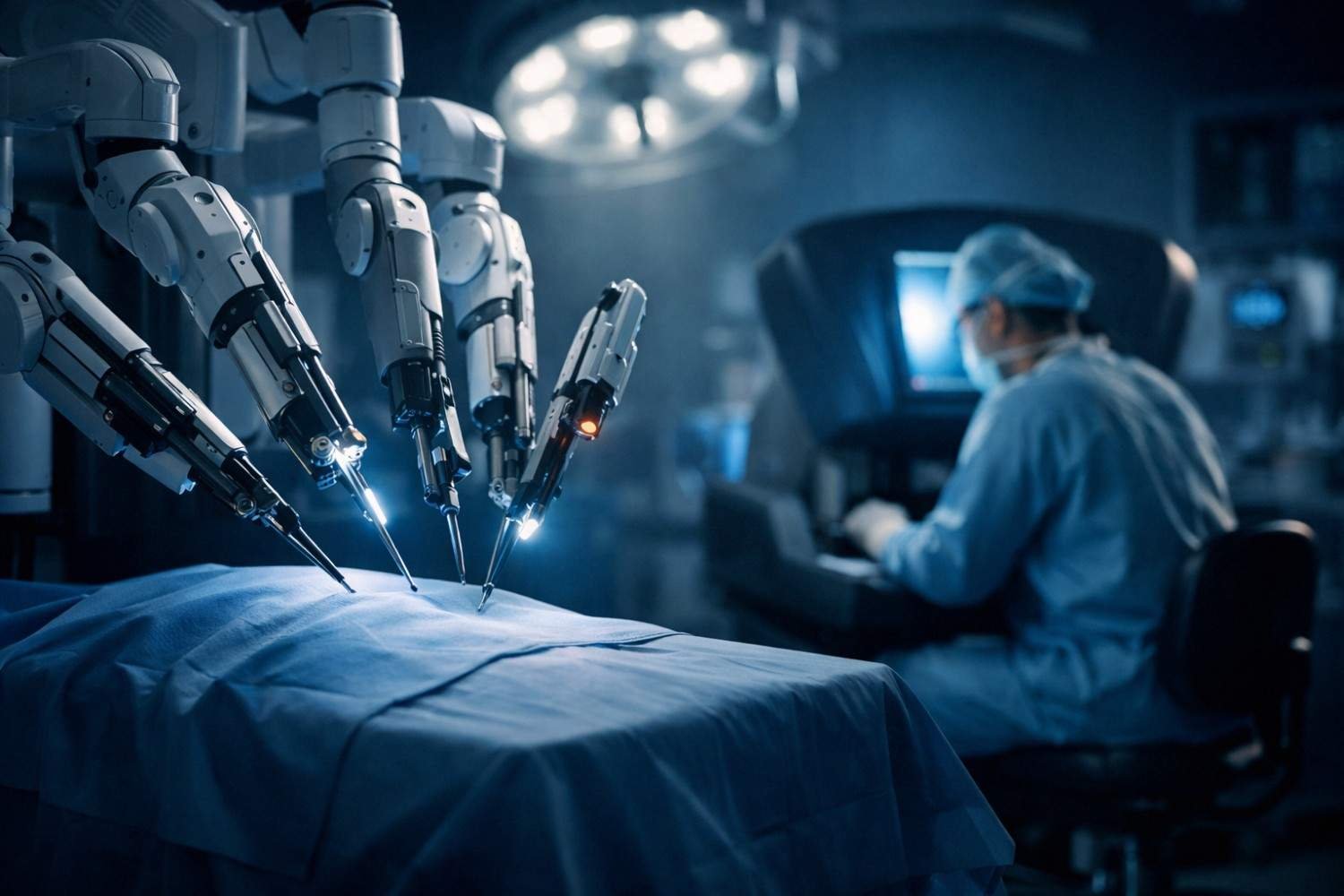

The field of thoracic surgery, which involves procedures on organs within the thorax (chest), including the lungs, esophagus, and heart, is undergoing considerable transformation appreciation to the integration of artificial intelligence (AI). Technological advancements are revolutionising how thoracic surgeons approach complex surgeries, promising enhanced precision and improved patient outcomes. This blog will investigate how AI reshapes thoracic surgery and its prospects.
Thoracic surgery encompasses a range of procedures to treat conditions within the chest cavity. Common surgeries include lung resections for cancer, esophagectomies, and heart surgeries. Despite advancements in medical science, traditional thoracic surgery presents numerous challenges, such as the procedures' complexity, complications' risks, and the need for high precision.
Artificial intelligence, containing machine learning and deep learning, is becoming increasingly influential in healthcare. AI applications range from diagnostic imaging to predictive analytics and robotic surgery. By leveraging vast data, AI systems can identify patterns and make informed decisions, enhancing medical practices and patient care.
Also Read Our Latest Blog: Power of Artificial Intelligence in Lung Cancer Diagnosis
1. AI-Assisted Robotic Surgery Systems: Robotic systems, guided by AI algorithms, can perform intricate surgical tasks with unmatched precision. These systems provide surgeons with enhanced skill and control, lowering the margin of error and improving surgical results. According to a 2023 survey published in the Journal of Thoracic Disease, the use of AI-assisted robotic systems in thoracic surgery has been associated with a 30% reduction in surgical complications and a 25% decrease in recovery time compared to traditional methods.
2. Advanced Imaging and Diagnostic Tools: AI-powered imaging technologies, such as CT scans and MRIs, can detect abnormalities and diseases early. These tools provide detailed, real-time insights that aid surgeons in planning and executing procedures more accurately. A 2022 report from the American College of Radiology noted that AI-enhanced imaging tools have increased the early detection rates of lung cancer by 20%, significantly improving patient prognosis.
3. Predictive Analytics for Surgical Outcomes: AI algorithms can examine patient data to predict possible complications and outcomes. This predictive capability allows surgeons to take preemptive measures, improving patient safety and recovery rates. A 2023 European Journal of Cardio-Thoracic Surgery study found that predictive analytics reduced postoperative complication rates by 18% and improved overall patient outcomes.
4. Real-Time Monitoring and Decision Support Systems: AI systems can continuously monitor patient vitals during surgery, providing real-time feedback and recommendations. This support ensures surgeons can make informed decisions quickly, enhancing the surgical process. A 2023 clinical trial data indicated that AI-driven decision support systems improved intraoperative decision-making accuracy by 22%.
The integration of AI in thoracic surgery offers numerous benefits:
1. Enhanced Precision and Accuracy: AI systems provide surgeons unparalleled precision, minimising errors and ensuring successful outcomes. A survey by the American Association for Thoracic Surgery in 2023 found that 85% of thoracic surgeons using AI reported improved surgical precision.
2. Reduced Recovery Time and Complications: AI-assisted surgeries are less invasive, leading to faster recovery and fewer complications. Data from the Journal of Surgical Research in 2022 showed that patients undergoing AI-assisted thoracic surgeries experienced a 20% reduction in hospital stay duration.
3. Improved Diagnostic Capabilities: AI-powered diagnostic tools enable early detection of diseases, allowing for timely and effective treatment. The National Cancer Institute reported a 25% increase in early-stage lung cancer diagnoses due to AI-enhanced imaging.
4. Personalised Treatment Plans: AI can analyse individual patient data to develop customised treatment plans, enhancing patient care and satisfaction. A 2023 International Journal of Medical Informatics analysis showed that personalised AI-driven treatment plans improved patient satisfaction scores by 30%.
While AI presents immense potential, there are challenges to its widespread adoption:
1. Ethical and Legal Considerations: The use of AI in surgery raises ethical and legal questions regarding accountability and patient consent. A 2023 survey by the American Medical Association discovered that 60% of healthcare professionals expressed concerns about the moral implications of AI in surgery.
2. Data Requirements: AI systems must function effectively with high-quality, extensive datasets. The availability of comprehensive patient data remains a challenge, particularly in developing regions.
3. Cost and Accessibility: Implementing AI technologies can be costly, posing a barrier for some healthcare institutions. A report by McKinsey & Company in 2022 estimated that the initial investment in AI-assisted surgical systems could exceed $2 million per hospital.
4. Training and Education: Surgeons and medical staff need adequate training to utilise AI tools effectively, which can be a significant undertaking. The American Board of Thoracic Surgery highlighted that integrating AI training into surgical education programs is essential but challenging.
Case Study 1: In a groundbreaking procedure, an AI-assisted robotic system successfully performed a complex lung resection with minimal complications. The patient, who had been diagnosed or treated with lung cancer, experienced a speedier recovery and a significant reduction in postoperative pain.
Case Study 2: Another notable case involved using AI in preoperative planning for a patient requiring esophageal cancer surgery. By analysing the patient's medical history and imaging data, AI helped the surgical team develop a precise plan that resulted in successful surgery and improved postoperative outcomes.
Emerging Technologies: The future of AI in thoracic surgery is promising, with emerging technologies poised to revolutionise the field further. Innovations such as machine learning algorithms that predict surgical outcomes and AI-driven robotic systems that perform autonomous procedures are on the horizon.
Research and Development: Ongoing research and development efforts are crucial for advancing AI technologies in thoracic surgery. Collaborative efforts between surgeons, engineers, and researchers will drive the development of cutting-edge AI tools and techniques.
Vision for the Future: The next decade holds immense potential for AI in thoracic surgery. We expect more personalised and precise surgical interventions, reduced recovery times, and improved patient outcomes. The integration of AI will continue to transform the landscape of thoracic surgery, making procedures safer and more effective.
As AI continues to evolve, its impact on thoracic surgery will undoubtedly grow, offering enhanced precision and better patient outcomes. Surgeons like Dr. Parveen Yadav at Chest Surgery India, recognised as the best thoracic oncology surgeon in Gurgaon, Delhi, are at the forefront of this transformation, embracing AI technologies to provide state-of-the-art maintenance and improve the lives of their patients.
1. What is AI's role in thoracic surgery?
AI enhances precision and outcomes in thoracic surgery by providing advanced diagnostic tools, robotic assistance, and predictive analytics.
2. How is AI currently being used to improve thoracic surgery outcomes?
Through advanced diagnostic tools and robotic assistance, AI enhances surgical precision, reduces complications, and shortens recovery times.
3. What are the latest advancements in AI-powered robotic systems for thoracic surgery?
Recent advancements include AI-assisted robotic systems that perform complex surgeries with greater precision and control.
4. How has AI impacted the early detection and treatment of lung cancer?
AI-powered imaging technologies have significantly increased early detection rates, improving patient prognosis and treatment outcomes.
5. How are hospitals and medical institutions adapting to integrating AI in surgical procedures?
Hospitals are investing in AI technologies and training programs to equip surgeons and medical staff with the necessary skills to use these tools effectively.
6. Who is leading AI advancements in thoracic surgery?
Surgeons like Dr. Parveen Yadav at Chest Surgery India embrace AI technologies to provide state-of-the-art care and improve patient outcomes.
Dr. Parveen Yadav is a highly recommended surgeon or specialist for thoracic oncology treatment in Gurgaon, Delhi. He specialises in minimally invasive and robotic thoracic onco surgery. He has been recognised for 17+ years as the best chest surgeon in Gurgaon, Delhi, for his expertise in treating chest-related (Chest Surgery) ailments, such as Esophageal (Food Pipe Cancer), Lung, Tracheal (Throat), Chest wall tumours, Mediastinal Tumours, Empyema, and Bronchopleural Fistula cancer. With a focus on precision and innovation, he is dedicated to offering exceptional care to his patients, utilising techniques to ensure optimal outcomes.

18+ Yrs Exp | 5,700+ Thoracic & Robotic Cancer Surgeries
Dr. Parveen Yadav is a Director and Senior Consultant in Thoracic and Surgical Oncology, specializing in minimally invasive and robotic lung and esophageal surgeries, with advanced training from AIIMS and Tata Memorial Hospital.
View Full Profile Pain After Thoracic Surgery: Tips for Smooth Recovery
Pain After Thoracic Surgery: Tips for Smooth Recovery
 Diet & Lifestyle for Thoracic Cancer Prevention | Dr. Parveen Yadav
Diet & Lifestyle for Thoracic Cancer Prevention | Dr. Parveen Yadav
 Robotic Thoracic Surgery: How Da Vinci Technology is Revolutionizing Chest Procedures
Robotic Thoracic Surgery: How Da Vinci Technology is Revolutionizing Chest Procedures
Struggling with pain after chest surgery? Dr. Parveen Yadav shares expert recovery tips, causes of shoulder pain, PTPS signs, and what your discharge sheet won't tell you.
Discover how diet, breathing exercises & daily habits help prevent and recover from thoracic cancer. Expert insights from Dr. Parveen Yadav, Chest Surgery India
Discover how Da Vinci robotic surgery is transforming chest procedures in Gurgaon. Less pain, faster recovery & expert care by a certified thoracic surgeon
Copyright 2026 © Dr .Parveen Yadav all rights reserved.
Proudly Scaled by Public Media Solution!